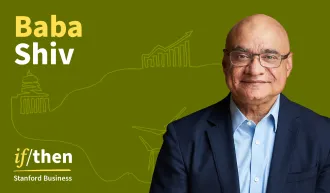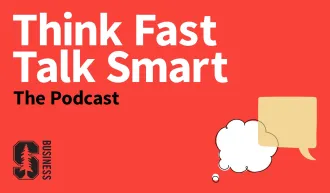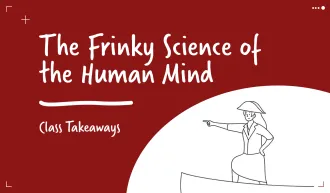Alix Guerrier: “We’re Not a Teaching Tool. We’re a Teacher Tool”
A startup helps school-based teachers of math and English team up with digital instruction programs for students.
October 02, 2012

A teacher at Bunker Hill Community College in Boston | REUTERS/Brian Snyder )
LearnZillion is part of a new generation of education technology companies that uses the tools of the web and social media to supplement what happens in the classroom. A for-profit company, it has received funding from venture capitalists, as well as the Gates Foundation, and currently makes a package of online videos about English and math topics used by 25,000 students in grades 3 through 8. Its leaders hope to eventually expand to cover all grades and subjects. At the Symposium on Technology in Education, held earlier this month at Stanford GSB, we talked with a cofounder of the Washington, D.C., company, Alix Guerrier, a former teacher and McKinsey consultant, as well as a member of the business school’s class of 2005.
There are some people who say that pre-packaged curricula end up taking the spontaneity out of learning, with the result that schools end up “teaching to the test,” a common complaint about the No Child Left Behind effort.
There is really no other way to teach except to teach to a test, whether the test involves asking the kid “Did you get it?” or asking them to demonstrate that they understand something. So you can only teach to the test. That’s a problem only in so far as a test is a bad test. Remember, a test is just a demonstration of knowledge, and there are many ways of having a student do that.
The teachers that you use in your instructional videos: How do you find them?
It’s not crowd-sourced; it’s from what we call our “education dream team.” We went out and recruited very good teachers from around the country. We had about 1,000 applicants, and we accepted about 10% of them. These are teachers who teach math and English. They applied last spring and at the beginning of the summer. We brought them all to Atlanta, with the help of the Gates Foundation, where we gave them some technology and sent them off so that over the course of the summer they could create video lessons. We paid them $100 a lesson. Many of them created 20 lessons, so they got $2,000.
The Kahn Academy is widely known, and has a huge and growing library of videos covering seemingly every conceivable topic. What value-add does a small company like LearnZillion have vis-Ã -vis what appears to be a Kahn Academy juggernaut?
We are not a teaching tool; we are a teacher tool. We are designing tools that teachers — live human beings — can use with students. That’s our mantra. Teachers like us because they believe that they can use us in the classroom, but that we aren’t threatening their jobs. In fact, most teachers feel like they’re better when they are using our materials.
For example, we have a feature called Coach’s Commentary, that is only for teachers. It’s like the director’s commentary on a DVD, but instead of the director talking about a movie, it’s a teacher talking about the approach that was taken for a specific lesson.
Also, we are focused on a specific sector, K-12, whereas the Kahn Academy has a broader mission.
There has been some criticism of the Kahn Academy approach, with some studies finding that students don’t really study and absorb the videos, but instead click through as quickly as possible to show they’ve completed a lesson, using hints supplied by the videos to answer questions. What’s going on?
You get the behavior that you reward for. If you have a very strong reward system that is based on advancing to ever-higher levels, or kicking up a score counter, that’s the behavior you’re going to get. A lot of people talk about “game-ifying” education, turning everything into a contest, but not us. It’s possible to do game-ification well, but it’s easier to do it poorly, by targeting a metric of behavior that’s not really advancing learning.
Many people believe we are in the middle of an education technology bubble, with over-investment by VCs and with unrealistic expectations about how much education will be changing. Are there things that people are predicting for the near future that you think simply won’t happen?
Yes. What won’t happen next year is that all students will be in a radically different environment — one in which they will be getting a lot of instruction through a “smart engine” that knows everything about them. That will happen eventually, but definitely not next year, and not for a couple of years, even though people are talking about it like it is right around the corner. The reality is that classrooms for the foreseeable future will look just like they have for the last 150 years. But while bubbles pop, the foundation that was laid usually leads to something later on. With regard to education, I think that means that more and more students will be learning through alternative means.
For media inquiries, visit the Newsroom.
Explore More

So Crazy, It Might Just Work: How Foolishness Feeds Innovation

Profile of Purpose: Clear as Water



